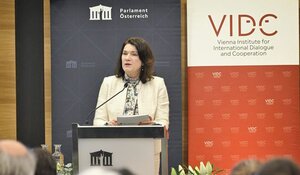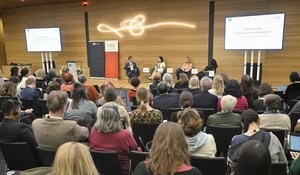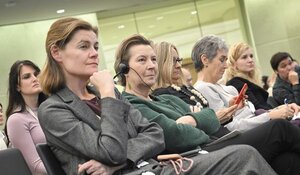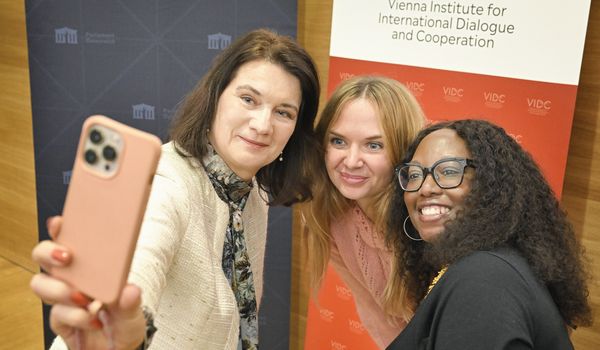This is a revised version of Linde’s speech at the well-attended public event in the Austrian Parliament titled “Feminist Foreign Policy. Experiences, Potentials and Challenges” on 28 November 2023.
We are living in times of crisis. More than one and a half year since Russia’s illegal invasion of Ukraine and no peace in sight. We know that sexual- and gender based violence is used by the Russian perpetrators. More than two years has now passed since the Taliban took control in Afghanistan and the situation for women and girls are horrific. The brave women in Iran are still protesting a misogynist regime, many of them paying a heavy price with prison, torture and even death. And the world is terrified after the shocking terrorist attacks on Israel by Hamas on 7 October, and the thousands of civilians in Israel and Gaza that have been victims. The first week in December 2023 the COP28 is taking place in Doha, and trying to find solutions to the climate and environmental crisis that threatens our planet and its inhabitants. Also here we know that this is disproportionally affecting women and girls.

Why did Sweden start a Feminist Foreign Policy?
When half of the population still does not enjoy the same Rights, Representation and Resources as the other half, there is a need to adopt a gender lens to foreign policy. In my experience, after nearly 7 years as Minister for Trade, EU and finally Foreign Affairs, such a lens transforms our view of the world. I have witnessed first-hand the importance of this agenda on the ground in many conflict areas, including in Ukraine and the Caucasus. Common to all these conflicts and crises are that women, girls and marginalised individuals – due to historical and structural inequalities – are hit the hardest.
Gender equality is a fundamental prerequisite to achieve all foreign policy goals. Sustainable peace, security and the fulfilment of the Sustainable Development Goals cannot be achieved if we exclude half of the world’s population and many more agree on the importance of applying a systematic gender perspective to foreign policy.
That is why in 2014, Sweden became the first country in the world to declare a Feminist Foreign Policy and establish a new standard that several countries have followed. When the idea of Feminist Foreign Policy was first introduced, the gendered dimension of foreign policy was in fact, far from unknown. And yet, it was met with much suspicion and even ridicule. It took quite some time to get the whole Foreign Service to understand what we wanted, but after the initial problems, even long-time male ambassadors got it!
Nevertheless, the systematic integration in external affairs of women and girls' rights, followed by the mobilization of adequate resources and the promotion of women's representation in decision-making has produced tangible results and changes, ending by encouraging other pioneering countries which have incorporated (or made an effort to adopt) feminist principles into their foreign policies too. Til today around 15 countries from different parts of the world have declared a Feminist Foreign Policy. It was and is important to use the concept of “Feminist”, to underline that there is a systematic discrimination of women and girls, not just an issue of individual women.
One of the most important things with pursuing a Feminist Foreign Policy is the fact that you do it systematically. It is not just a “gender ad hoc thing you need to remember”. A feminist approach is not only about a perspective. It is a way of analysing and developing policy and operational responses to the challenges we face today. It contributes to a sustainable and peaceful development and future. And it helps us become a counterbalance to the actors pushing back against gender equality in different contexts and arena.
The three “R:s” – an important tool to use
A tool to use is the three R:s: Rights, Representation and Resources.
Rights – the simple fact is that human rights are also women’s rights. Here, two fundamental tracks must be followed when pursuing a Feminist Foreign Policy. Firstly, there are areas where we must aim for prohibition, such as gender-based discrimination, forced marriages and Female Genital Mutilation (FGM). Secondly, there are areas where the aim is progress, for example equal rights to inheritance and access to education and health, including sexual and reproductive health and rights. These areas are key to women’s empowerment.
Representation – all individuals must have the same right to participation, education and influence in decision-making processes. Women are chronically underrepresented at key forums where decisions are made. This goes for all areas, be it in peace negotiations, company boards or political parties.
Resources – resources need to be allocated to promote equal opportunities. This means that we should identify and promote targeted measures – for example strengthening gender mainstreaming of grants management and pursue gender- and diversity-responsive budgeting.

Example on how you implement a Feminist Foreign Policy
Sweden formulated six explicit goals for the Feminist Foreign Policy, which should lead the way in all bilateral and multilateral activities (see Handbook. Sweden´s feminist foreign policy, 2019).
Two concrete examples on how Sweden systematically applied the Feminist Foreign Policy were during our time in the UN Security Council (UNSC) in 2017-18 and when we were Chairperson in Office in the Organisation for Cooperation and Security in Europe 2021. In UNSC we consistently sought to ensure that the Council included a focus on Women Peace and Security (WPS) in all discussions and decisions. We pushed for the Council to be briefed by civil society representatives, for WPS to be discussed in each and every country file, and we showed that it was indeed possible to achieve gender balance among those briefing the Council during Sweden’s Presidency in July 2018. I am happy to see how several members have taken this approach onboard.
As Chairperson in Office in OSCE, I in a similar way sought to integrate WPS in all dimensions. I brought the situation for women and girls in all my meetings, and I consulted with women’s organizations in every visit in the region, including in Central Asia, Russia and Ukraine.
The OSCE Special Envoys to conflicts were asked to especially look at how to increase women’s participation in peace processes. I appointed a special representative for gender, and an advisory group on gender to advice OSCE.

What are the results so far of the first years of a Feminist Foreign Policy?
We now have the first academic evaluation of the Feminist Foreign Policy. The University of Gothenburg has put a very adequate headline: “More than a label, less than a revolution”.
The main conclusion is that implementation of a Feminist Foreign Policy consisted of much more than simply re-labeling existing gender equality activities as “feminist”, but that implementation was uneven and incomplete. Overall, there was a marked increase in gender equality work among foreign policy agencies and aid embassies after the FFP was launched. There was also marked variation in how the FFP was implemented. The researchers and writers of the evaluation says that feminist foreign policy being just “a label” or “poster politics” is a common misconception. After a systematic review of what feminist foreign policy meant in practice for the bilateral work in the Foreign Service they concluded that "feminism" was never just a label.
The feminist foreign policy led to a concerted effort, with more gender equality initiatives and a number of new initiatives in all areas of foreign policy: foreign trade, international common misconception development cooperation, and security policy.
They also pointed to the fact that there is a perception that the withdrawal of feminist foreign policy means that Sweden's gender equality work will come to a complete halt. This is yet another misunderstanding.
The government's withdrawal of feminist foreign policy does not mean that Sweden can stop working on international gender equality issues. On the contrary, Sweden has far-reaching commitments in this area and has undertaken in various ways to continue its international gender equality work. I hope that these experiences will make more countries ready to pursue a Feminist Foreign Policy. I would recommend that before the introduction, the leadership do a thorough exploration of how other countries have done, formulate goals that are suitable for your specific countries, and have the full backing of the Prime Minister!

